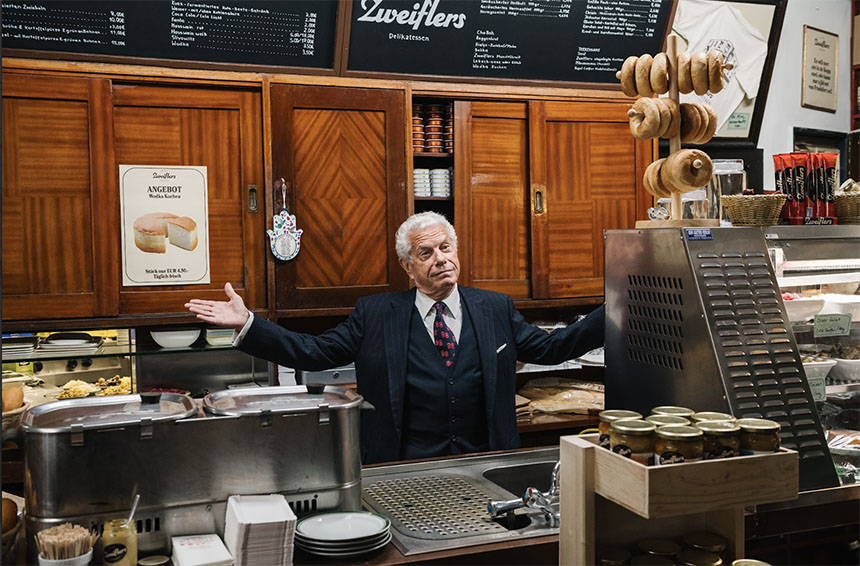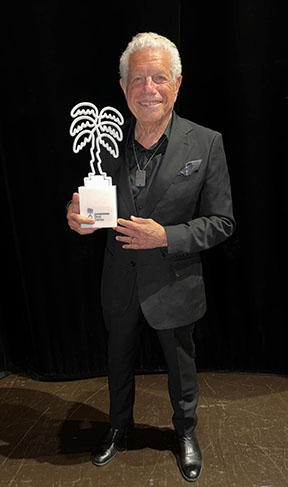 Mike Burstyn in ‘Die Zweiflers’
Mike Burstyn in ‘Die Zweiflers’ The offer to star in a German series caught Mike Burstyn completely off guard. Here he was, leading a quiet life in Los Angeles, working as a dubbing director for Netflix, and occasionally jetting off to Israel for acting gigs, when suddenly he found himself approached to take the lead role in a major television production.
“The creator/writer was in search of someone fluent in both Yiddish and German, and that’s how they came across me,” said Burstyn in an interview with the Journal. “Once my agent received the casting call, she promptly said, ‘Look no further. I have just the man you need.'”
The story of ‘Die Zweiflers’ takes place in 2015, Frankfurt. Holocaust survivor Symcha Zweifler wishes to retire and bequeath his business to his children and grandchildren. He invites them over and tells them about his plans, but they are not interested in the Delicatessen business. And so, Symcha decided to sell the business to a large German company. The story about the sell is published in the press which brings someone who knew him in his younger years. He threatens to expose Symcha’s past if Symcha doesn’t pay him.
The creator and showrunner of the series is David Hadda, himself a grandson of Holocaust survivors who chose to remain in Germany after the war. “David told Variety that if he hadn’t discovered me, the series might never have come to fruition,” Burstyn said. “They scoured Germany for an actor who could authentically embody the persona of a Holocaust survivor but couldn’t find one. Additionally, they required someone fluent in Yiddish and German. It felt as though the role had been tailor-made for me.”
There are plentiful of series and movies which explore Germany’s Nazi history. Yet, amidst this sea of content, few Germans can readily recall a series that delves into the daily lives of a Jewish family within contemporary Germany.
Burstyn believes that the first season will ignite discussions once it’s going to start airing on May 1 in Germany. It’s currently being sold worldwide by ZDF Studios.
Burstyn was born in New York to Yiddish-language actors Pesach Burstein and Lillian Lux. He embarked on his acting journey alongside his twin sister in his parents’ productions from a tender age. By seven, they were traversing the globe, gracing stages with Yiddish performances. During the time the family lived in South America, Burstyn mastered Spanish and Portuguese; in France, he honed his French; and upon the family’s immigration to Israel in 1954, he learned Hebrew.
“During my theater days in Israel, I worked with German actors, prompting me to learn German as well. Working on the series provided an opportunity to further refine my German skills, and now I am fluent,” he said. In total, the versatile actor commands proficiency in eight languages.
Reflecting on his unexpected role, Burstyn admitted it took him entirely by surprise. At 78, he never imagined landing the lead in a German TV series. He considers himself fortunate, acknowledging the transformative roles that have punctuated his career. “The first was ‘Two Kunilmel’ in 1966 [in Israel], which changed my trajectory. People still reminisce, telling me, ‘We grew up watching you.’ Then came Broadway in 1981, where I made history as the first Israeli actor to headline. Subsequently, I embarked on a three-year stint on Dutch television. Amidst COVID-19, I was offered a chance to direct dubbing for Netflix. In 2017, I persuaded friends to invest in ‘Azimut,’ my directorial debut. I’m a fortunate man. Life surprises you when you least anticipate it.”
“The series resemble the American show ‘Succession,'” Burstyn observed, “with a patriarch at its helm and his children quarreling with each other. In today’s climate, marked by resurgent anti-Semitism worldwide, it’s remarkable to see German television tackling a narrative centered on a Holocaust survivor. The Germans are the only ones still on our side when the whole world is against us.”
Hadda submitted the series to competition at the Cannes Film Festival and it was accepted along with 7 other series out of 200 submitted from all over the world. On April 10, Burstyn headed off to the festival, where the initial two episodes were premiered to glowing reviews from both critics and audiences alike. To everyone’s delight, the show received the prestigious award for Best TV Series at Canneseries.

Burstyn along with the cast, creator and director came on stage to the sound of cheers from the audience. “I was wearing a “Bring them home now’ silver disk,” said Burstyn. “It was important for me.”
Addressing the audience, he expressed gratitude to ARD and Degeto, the two companies behind the show, for their bravery in bringing the narrative of a Holocaust survivor to German television. Then concluded his speech by saying, “Am Israel Chai.”
After stepping off the stage, Burstyn was approached by local Jews who commended his words. “They discreetly revealed similar disks, some plated in gold, tucked inside their shirts, expressing their apprehension about openly wearing them as I did onstage,” Burstyn said. “They admitted they were simply too scared to walk around with them in France.”
Burstyn confessed that he had always wondered why so many Polish children opted to remain in Germany after the war. After all, the Nazis had stripped them of everything—their families, homes, and childhoods. Portraying Symcha helped him grasp their perspective better. His character was only ten years old when he left Auschwitz and arrived in Frankfurt. Post-war, American soldiers transported the surviving children from the camps to Germany, providing them with matches, cigarettes, chocolates, and nylon socks from their stockpiles. The children sold these items to the Germans to sustain themselves.
“In the ’60s and ’70s, they shifted to establishing brothels in Frankfurt and amassed considerable wealth before transitioning to real estate investments,” Burstyn explained. “Today, half of Frankfurt’s real estate is owned by Jewish families. From the 1960s onwards, they began investing in real estate and hotels in Israel.”

This mirrors Symcha’s journey and how he initiated his delicatessen business.
“Those kids capitalized on the Germans’ post-war guilt. It was an opportunity to forge a new life in the very place where their oppressors had sought to destroy them. It was a defiant proclamation: ‘Not only did you fail to eliminate us, but we will thrive here. ’We are survivors.”






















 More news and opinions than at a Shabbat dinner, right in your inbox.
More news and opinions than at a Shabbat dinner, right in your inbox.